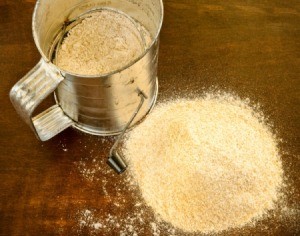 Can unbleached all-purpose flour be used in recipes that call for regular all-purpose flour? I bought it by mistake. Thank you for answering.
Can unbleached all-purpose flour be used in recipes that call for regular all-purpose flour? I bought it by mistake. Thank you for answering.
By Joan Dykes from Praireville, LA

Flour Substitutions
Although the finished results will be slightly altered, in many cases it is possible to substitute one flour for another in a recipe. Exceptions are noted atthe end of this tape.
If a more nutritious product is desired, whole grain flours may be used in place of white all purpose flour. Baked products made with whole grain flour will be more dense than their white counterparts. Experiment with substituting various percentages of the white flour with whole grain flour to find a finished product that pleases you.
Individuals with wheat allergies may experiment using other grain flours, but will have best results following a recipe developed for a specific flour. Cooperative Extension has a bulletin titled Baking for People with Food Allergies which includes numerous recipes and substitution directions.
A nutritious "white" bread may be achieved using the Cornell University developed flour formula. When measuring one cup of flour, first place 1 tablespoon of soya flour, 1 tablespoon dry milk solids and 1 tablespoon wheat germ in the cup and then fill it with unbleached enriched flour. This mixture may be used in all baked products.
Self-rising flour may be made by placing 1 1/2 teaspoons baking powder and 1/2 teaspoon salt in a one cup measure and then filling it with flour. If you want to substitute self-rising flour in a recipe calling for regular flour, eliminate the salt and baking powder in the original recipe.
White flour is available in many varieties. All purpose white is a blend of hard and soft wheats, which gives it enough gluten (the protein in flour) to achieve an elastic, porous product while also being tender. Bleached and unbleached flour may be used interchangeably.
Bread flour has a great proportion of gluten. While it produces an excellent bread, it does not work well in cakes or pastries.
Cake flour is made from soft wheat, and produces a delicate, crumbly texture. Pastry flour is also extremely delicate. Neither should be used for bread making. The exception is whole wheat pastry flour which can be used in conjunction with white bread flour (preferably unbleached) to make a softer, light colored wheat bread.
good luck.
Although bleached and unbleached flour can be used intechangably, the unbleached flour is a superior product because you are not getting chemicals that are used to "bleach" the flour. This was a "good"
Absolutely, I've been doing that for years myself.
kffrmw88, Thank you very much for the info-I'm saving it, Joanie
In short it will be fine and better for you, because who wants to eat bleach?